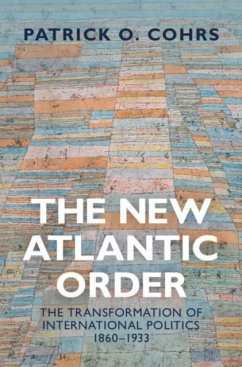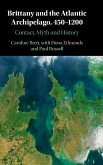Patrick O. Cohrs (Florence Universita degli Studi)
The New Atlantic Order
The Transformation of International Politics, 1860-1933
Patrick O. Cohrs (Florence Universita degli Studi)
The New Atlantic Order
The Transformation of International Politics, 1860-1933
- Gebundenes Buch
- Merkliste
- Auf die Merkliste
- Bewerten Bewerten
- Teilen
- Produkt teilen
- Produkterinnerung
- Produkterinnerung
The New Atlantic Order sheds new light on the struggle to create a modern Atlantic order. Patrick O. Cohrs reinterprets the Paris Peace Conference of 1919 as the original attempt to supersede the Eurocentric 'world order' of the age of imperialism and found a more legitimate peace system.
Andere Kunden interessierten sich auch für
![A Cultural History of the Atlantic World, 1250-1820 A Cultural History of the Atlantic World, 1250-1820]() John K. Thornton (Boston University)A Cultural History of the Atlantic World, 1250-182044,99 €
John K. Thornton (Boston University)A Cultural History of the Atlantic World, 1250-182044,99 €![A Cultural History of the Atlantic World, 1250 1820 A Cultural History of the Atlantic World, 1250 1820]() John K. Thornton (Boston University)A Cultural History of the Atlantic World, 1250 182084,99 €
John K. Thornton (Boston University)A Cultural History of the Atlantic World, 1250 182084,99 €![Lourenço da Silva Mendonça and the Black Atlantic Abolitionist Movement in the Seventeenth Century Lourenço da Silva Mendonça and the Black Atlantic Abolitionist Movement in the Seventeenth Century]() Jose Lingna Nafafe (University of Bristol)Lourenço da Silva Mendonça and the Black Atlantic Abolitionist Movement in the Seventeenth Century59,99 €
Jose Lingna Nafafe (University of Bristol)Lourenço da Silva Mendonça and the Black Atlantic Abolitionist Movement in the Seventeenth Century59,99 €![Lourenço da Silva Mendonça and the Black Atlantic Abolitionist Movement in the Seventeenth Century Lourenço da Silva Mendonça and the Black Atlantic Abolitionist Movement in the Seventeenth Century]() Jose Lingna Nafafe (University of Bristol)Lourenço da Silva Mendonça and the Black Atlantic Abolitionist Movement in the Seventeenth Century35,99 €
Jose Lingna Nafafe (University of Bristol)Lourenço da Silva Mendonça and the Black Atlantic Abolitionist Movement in the Seventeenth Century35,99 €![Imperial Portugal in the Age of Atlantic Revolutions Imperial Portugal in the Age of Atlantic Revolutions]() Gabriel Paquette (The Johns Hopkins University Assistant ProfessorImperial Portugal in the Age of Atlantic Revolutions37,99 €
Gabriel Paquette (The Johns Hopkins University Assistant ProfessorImperial Portugal in the Age of Atlantic Revolutions37,99 €![Brittany and the Atlantic Archipelago, 450-1200 Brittany and the Atlantic Archipelago, 450-1200]() Caroline Brett (University of Cambridge)Brittany and the Atlantic Archipelago, 450-1200110,99 €
Caroline Brett (University of Cambridge)Brittany and the Atlantic Archipelago, 450-1200110,99 €![The Hughes Court: Volume 11 The Hughes Court: Volume 11]() Mark V. Tushnet (Massachusetts Harvard Law School)The Hughes Court: Volume 1154,99 €
Mark V. Tushnet (Massachusetts Harvard Law School)The Hughes Court: Volume 1154,99 €-
-
-
The New Atlantic Order sheds new light on the struggle to create a modern Atlantic order. Patrick O. Cohrs reinterprets the Paris Peace Conference of 1919 as the original attempt to supersede the Eurocentric 'world order' of the age of imperialism and found a more legitimate peace system.
Produktdetails
- Produktdetails
- Verlag: Cambridge University Press
- Seitenzahl: 1130
- Erscheinungstermin: 12. Mai 2022
- Englisch
- Abmessung: 237mm x 160mm x 72mm
- Gewicht: 1770g
- ISBN-13: 9781107117976
- ISBN-10: 1107117976
- Artikelnr.: 63198789
- Herstellerkennzeichnung
- Libri GmbH
- Europaallee 1
- 36244 Bad Hersfeld
- gpsr@libri.de
- Verlag: Cambridge University Press
- Seitenzahl: 1130
- Erscheinungstermin: 12. Mai 2022
- Englisch
- Abmessung: 237mm x 160mm x 72mm
- Gewicht: 1770g
- ISBN-13: 9781107117976
- ISBN-10: 1107117976
- Artikelnr.: 63198789
- Herstellerkennzeichnung
- Libri GmbH
- Europaallee 1
- 36244 Bad Hersfeld
- gpsr@libri.de
Patrick O. Cohrs is Professor of International History at the University of Florence. He was associate professor of history at Yale University, a fellow at Harvard University, and Alistair Horne Fellow at St Antony's College, Oxford. He is the author of the acclaimed The Unfinished Peace after World War I (Cambridge, 2006).
Contents; Acknowledgements; Abbreviations; List of maps; Introduction; Part
I. Inevitable Descent into the Abyss?: The Wider Pre-History of the Great
War. The Involution of International Politics at the Dawn of the "Long"
20th Century: 1. Peace through equilibrium. The 19th century's Vienna
system - and its disintegration; 2. Transformation and corrosion. The turn
towards power politics and global imperialist competition in the formative
decades of the "long" 20th century; 3. The "ascent" of an exceptionalist
world power. The American special path and ephemeral aspirations for an
Atlantic order of empires; 4. Counterforces - and first visions of a novel
transatlantic peace. Internationalist aspirations to overcome imperialist
power politics before 1914; 5. The unavoidable war? Long and short roads to
the catastrophe of 1914; Part II. The Greatest War - and No Peace Without
Victory: The Impact of the First World War, Competing Visions of Peace and
the Struggle over the Shape of a New - Atlantic - World Order: 6. Tectonic
changes. The consequences of the war and the transformation of the
transatlantic constellation; 7. The political and ideological "war within
the war". The transatlantic competition over the shape of the postwar
order; 8. No "peace without victory" - and the making of the frail Atlantic
armistice of November 1918; 9. No prospects for a lasting peace? The urgent
and the systemic challenges of peacemaking and the need for a new Atlantic
order; Part III. Reorientations and Incipient Learning Processes: The
Dominant - Atlantic - Approaches to Peace and Order after the Great War:
10. Towards a progressive Atlantic peace of the victors. The reorientation
of American approaches to peace and international order; 11. The search for
a new equilibrium - and an Atlantic concert. The reorientation of British
approaches to peace and international order; 12. The search for security
and an Atlantic alliance of the victors. The reorientation of French
approaches to peace and international order; 13. A new beginning? German
pursuits of a Wilsonian "peace of justice" and first steps towards an
Atlanticist foreign policy; Part IV. No "Pax Atlantica": The First Attempt
to Found a Modern Atlantic Order - and its Frustration: 14. An impossible
peace? The incomplete transatlantic peacemaking process of 1919; 15. Novel
superstructure of a new Atlantic order? The struggle to found the League of
Nations and the limitations of the covenant of 1919; 16. No just peace
without security. The pivotal German settlement and the struggle to found a
new Atlantic security system; 17. The eastern frontiers - and limits - of
the new order. Self-determination, the critical Polish-German question and
the wider challenges of "reorganising" Eastern Europe; 18. A formative
threat? The Western powers and the Bolshevik challenge; 19. The political
and moral stakes of reparations - and the limited advances towards a new
Atlantic economic order; 20. The imposed peace. The missed opportunity of a
negotiated settlement with Germany?; 21. The truncated Atlantic peace order
of 1919 - a re-appraisal; Part V. Epilogue: The Political Consequences of
the Peace: The Challenges after Versailles and the Making of the Unfinished
Atlantic Peace of the 1920s: 22. Peace undermined. The divergent outlooks
of the victors, the consequences of Wilson's defeat and the escalation of
Europe's postwar crisis; 23. Towards a new order. Constructive learning
processes and the construction of an Atlantic peace beyond Versailles; 24.
The remarkable consolidation of the nascent Pax Atlantica of the 1920s -
and its dissolution under the impact of the world economic crisis; Part VI.
Final Perspectives - the Cadmeian Peace: 25. The eventual creation of the
"long" 20th century's Atlantic order after 1945 and the crucial lessons of
the era of the First World War; Bibliography.
I. Inevitable Descent into the Abyss?: The Wider Pre-History of the Great
War. The Involution of International Politics at the Dawn of the "Long"
20th Century: 1. Peace through equilibrium. The 19th century's Vienna
system - and its disintegration; 2. Transformation and corrosion. The turn
towards power politics and global imperialist competition in the formative
decades of the "long" 20th century; 3. The "ascent" of an exceptionalist
world power. The American special path and ephemeral aspirations for an
Atlantic order of empires; 4. Counterforces - and first visions of a novel
transatlantic peace. Internationalist aspirations to overcome imperialist
power politics before 1914; 5. The unavoidable war? Long and short roads to
the catastrophe of 1914; Part II. The Greatest War - and No Peace Without
Victory: The Impact of the First World War, Competing Visions of Peace and
the Struggle over the Shape of a New - Atlantic - World Order: 6. Tectonic
changes. The consequences of the war and the transformation of the
transatlantic constellation; 7. The political and ideological "war within
the war". The transatlantic competition over the shape of the postwar
order; 8. No "peace without victory" - and the making of the frail Atlantic
armistice of November 1918; 9. No prospects for a lasting peace? The urgent
and the systemic challenges of peacemaking and the need for a new Atlantic
order; Part III. Reorientations and Incipient Learning Processes: The
Dominant - Atlantic - Approaches to Peace and Order after the Great War:
10. Towards a progressive Atlantic peace of the victors. The reorientation
of American approaches to peace and international order; 11. The search for
a new equilibrium - and an Atlantic concert. The reorientation of British
approaches to peace and international order; 12. The search for security
and an Atlantic alliance of the victors. The reorientation of French
approaches to peace and international order; 13. A new beginning? German
pursuits of a Wilsonian "peace of justice" and first steps towards an
Atlanticist foreign policy; Part IV. No "Pax Atlantica": The First Attempt
to Found a Modern Atlantic Order - and its Frustration: 14. An impossible
peace? The incomplete transatlantic peacemaking process of 1919; 15. Novel
superstructure of a new Atlantic order? The struggle to found the League of
Nations and the limitations of the covenant of 1919; 16. No just peace
without security. The pivotal German settlement and the struggle to found a
new Atlantic security system; 17. The eastern frontiers - and limits - of
the new order. Self-determination, the critical Polish-German question and
the wider challenges of "reorganising" Eastern Europe; 18. A formative
threat? The Western powers and the Bolshevik challenge; 19. The political
and moral stakes of reparations - and the limited advances towards a new
Atlantic economic order; 20. The imposed peace. The missed opportunity of a
negotiated settlement with Germany?; 21. The truncated Atlantic peace order
of 1919 - a re-appraisal; Part V. Epilogue: The Political Consequences of
the Peace: The Challenges after Versailles and the Making of the Unfinished
Atlantic Peace of the 1920s: 22. Peace undermined. The divergent outlooks
of the victors, the consequences of Wilson's defeat and the escalation of
Europe's postwar crisis; 23. Towards a new order. Constructive learning
processes and the construction of an Atlantic peace beyond Versailles; 24.
The remarkable consolidation of the nascent Pax Atlantica of the 1920s -
and its dissolution under the impact of the world economic crisis; Part VI.
Final Perspectives - the Cadmeian Peace: 25. The eventual creation of the
"long" 20th century's Atlantic order after 1945 and the crucial lessons of
the era of the First World War; Bibliography.
Contents; Acknowledgements; Abbreviations; List of maps; Introduction; Part
I. Inevitable Descent into the Abyss?: The Wider Pre-History of the Great
War. The Involution of International Politics at the Dawn of the "Long"
20th Century: 1. Peace through equilibrium. The 19th century's Vienna
system - and its disintegration; 2. Transformation and corrosion. The turn
towards power politics and global imperialist competition in the formative
decades of the "long" 20th century; 3. The "ascent" of an exceptionalist
world power. The American special path and ephemeral aspirations for an
Atlantic order of empires; 4. Counterforces - and first visions of a novel
transatlantic peace. Internationalist aspirations to overcome imperialist
power politics before 1914; 5. The unavoidable war? Long and short roads to
the catastrophe of 1914; Part II. The Greatest War - and No Peace Without
Victory: The Impact of the First World War, Competing Visions of Peace and
the Struggle over the Shape of a New - Atlantic - World Order: 6. Tectonic
changes. The consequences of the war and the transformation of the
transatlantic constellation; 7. The political and ideological "war within
the war". The transatlantic competition over the shape of the postwar
order; 8. No "peace without victory" - and the making of the frail Atlantic
armistice of November 1918; 9. No prospects for a lasting peace? The urgent
and the systemic challenges of peacemaking and the need for a new Atlantic
order; Part III. Reorientations and Incipient Learning Processes: The
Dominant - Atlantic - Approaches to Peace and Order after the Great War:
10. Towards a progressive Atlantic peace of the victors. The reorientation
of American approaches to peace and international order; 11. The search for
a new equilibrium - and an Atlantic concert. The reorientation of British
approaches to peace and international order; 12. The search for security
and an Atlantic alliance of the victors. The reorientation of French
approaches to peace and international order; 13. A new beginning? German
pursuits of a Wilsonian "peace of justice" and first steps towards an
Atlanticist foreign policy; Part IV. No "Pax Atlantica": The First Attempt
to Found a Modern Atlantic Order - and its Frustration: 14. An impossible
peace? The incomplete transatlantic peacemaking process of 1919; 15. Novel
superstructure of a new Atlantic order? The struggle to found the League of
Nations and the limitations of the covenant of 1919; 16. No just peace
without security. The pivotal German settlement and the struggle to found a
new Atlantic security system; 17. The eastern frontiers - and limits - of
the new order. Self-determination, the critical Polish-German question and
the wider challenges of "reorganising" Eastern Europe; 18. A formative
threat? The Western powers and the Bolshevik challenge; 19. The political
and moral stakes of reparations - and the limited advances towards a new
Atlantic economic order; 20. The imposed peace. The missed opportunity of a
negotiated settlement with Germany?; 21. The truncated Atlantic peace order
of 1919 - a re-appraisal; Part V. Epilogue: The Political Consequences of
the Peace: The Challenges after Versailles and the Making of the Unfinished
Atlantic Peace of the 1920s: 22. Peace undermined. The divergent outlooks
of the victors, the consequences of Wilson's defeat and the escalation of
Europe's postwar crisis; 23. Towards a new order. Constructive learning
processes and the construction of an Atlantic peace beyond Versailles; 24.
The remarkable consolidation of the nascent Pax Atlantica of the 1920s -
and its dissolution under the impact of the world economic crisis; Part VI.
Final Perspectives - the Cadmeian Peace: 25. The eventual creation of the
"long" 20th century's Atlantic order after 1945 and the crucial lessons of
the era of the First World War; Bibliography.
I. Inevitable Descent into the Abyss?: The Wider Pre-History of the Great
War. The Involution of International Politics at the Dawn of the "Long"
20th Century: 1. Peace through equilibrium. The 19th century's Vienna
system - and its disintegration; 2. Transformation and corrosion. The turn
towards power politics and global imperialist competition in the formative
decades of the "long" 20th century; 3. The "ascent" of an exceptionalist
world power. The American special path and ephemeral aspirations for an
Atlantic order of empires; 4. Counterforces - and first visions of a novel
transatlantic peace. Internationalist aspirations to overcome imperialist
power politics before 1914; 5. The unavoidable war? Long and short roads to
the catastrophe of 1914; Part II. The Greatest War - and No Peace Without
Victory: The Impact of the First World War, Competing Visions of Peace and
the Struggle over the Shape of a New - Atlantic - World Order: 6. Tectonic
changes. The consequences of the war and the transformation of the
transatlantic constellation; 7. The political and ideological "war within
the war". The transatlantic competition over the shape of the postwar
order; 8. No "peace without victory" - and the making of the frail Atlantic
armistice of November 1918; 9. No prospects for a lasting peace? The urgent
and the systemic challenges of peacemaking and the need for a new Atlantic
order; Part III. Reorientations and Incipient Learning Processes: The
Dominant - Atlantic - Approaches to Peace and Order after the Great War:
10. Towards a progressive Atlantic peace of the victors. The reorientation
of American approaches to peace and international order; 11. The search for
a new equilibrium - and an Atlantic concert. The reorientation of British
approaches to peace and international order; 12. The search for security
and an Atlantic alliance of the victors. The reorientation of French
approaches to peace and international order; 13. A new beginning? German
pursuits of a Wilsonian "peace of justice" and first steps towards an
Atlanticist foreign policy; Part IV. No "Pax Atlantica": The First Attempt
to Found a Modern Atlantic Order - and its Frustration: 14. An impossible
peace? The incomplete transatlantic peacemaking process of 1919; 15. Novel
superstructure of a new Atlantic order? The struggle to found the League of
Nations and the limitations of the covenant of 1919; 16. No just peace
without security. The pivotal German settlement and the struggle to found a
new Atlantic security system; 17. The eastern frontiers - and limits - of
the new order. Self-determination, the critical Polish-German question and
the wider challenges of "reorganising" Eastern Europe; 18. A formative
threat? The Western powers and the Bolshevik challenge; 19. The political
and moral stakes of reparations - and the limited advances towards a new
Atlantic economic order; 20. The imposed peace. The missed opportunity of a
negotiated settlement with Germany?; 21. The truncated Atlantic peace order
of 1919 - a re-appraisal; Part V. Epilogue: The Political Consequences of
the Peace: The Challenges after Versailles and the Making of the Unfinished
Atlantic Peace of the 1920s: 22. Peace undermined. The divergent outlooks
of the victors, the consequences of Wilson's defeat and the escalation of
Europe's postwar crisis; 23. Towards a new order. Constructive learning
processes and the construction of an Atlantic peace beyond Versailles; 24.
The remarkable consolidation of the nascent Pax Atlantica of the 1920s -
and its dissolution under the impact of the world economic crisis; Part VI.
Final Perspectives - the Cadmeian Peace: 25. The eventual creation of the
"long" 20th century's Atlantic order after 1945 and the crucial lessons of
the era of the First World War; Bibliography.








